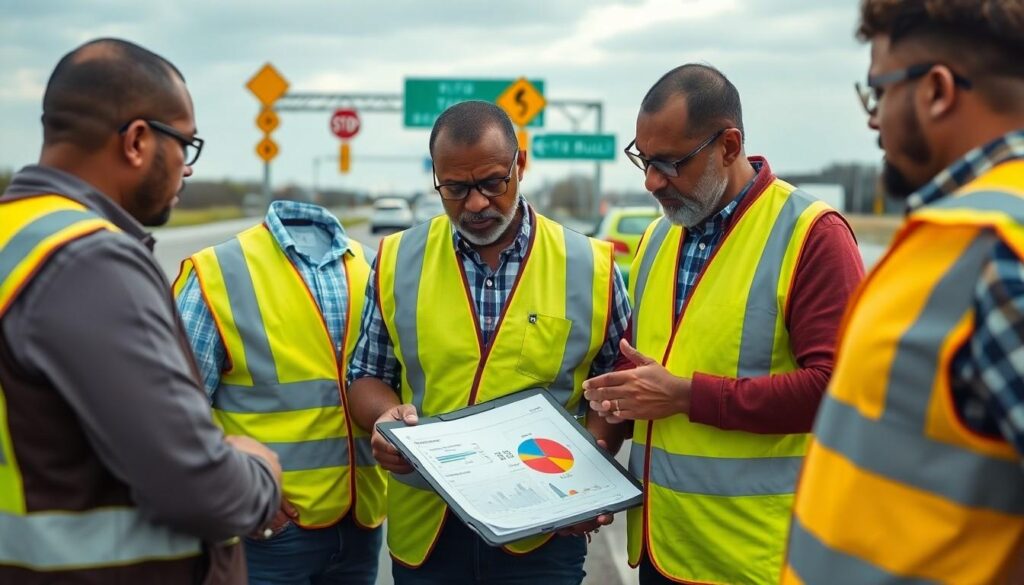Table of Contents
ToggleIn a world where traffic lights seem to have a mind of their own and pedestrians play a daring game of dodgeball with cars, transportation safety consultants are the unsung heroes. They don’t wear capes, but they do wield expertise that keeps our roads safe and our commutes less like a scene from a high-speed chase movie. With a mix of sharp analysis and a dash of humor, these professionals tackle everything from accident prevention to compliance with regulations, ensuring that safety isn’t just a suggestion—it’s a way of life.
Imagine a world where every road trip feels like a leisurely stroll through a park. That’s the goal of transportation safety consultants. They bring clarity to the chaos, helping businesses and municipalities navigate the intricate web of safety protocols. So buckle up and get ready to discover how these experts are transforming our transportation landscape, one safe mile at a time.
Overview of Transportation Safety Consultants
Transportation safety consultants play a vital role in improving road safety. Their expertise helps organizations navigate complex regulations and implement effective safety measures. Focused on reducing accidents, they analyze data and assess risks associated with various transportation systems.
Consultants conduct thorough audits of traffic patterns, vehicle conditions, and infrastructure. These experts also provide training programs to enhance the skills of drivers and transportation staff. By evaluating safety management systems, they identify areas needing improvement.
Collaboration is crucial in their work. They partner with governmental agencies, private companies, and community organizations to develop tailored safety plans. Regular communication with stakeholders ensures that safety initiatives align with local needs and compliance standards.
Data-driven strategies help consultants deliver effective recommendations. They often review accident reports, vehicle performance metrics, and environmental factors to derive insights. Utilizing technology, these professionals employ tools like simulation software to predict outcomes and devise solutions.
Transportation safety consultants contribute to a culture of safety. Their efforts promote awareness of best practices within the industry. By fostering a proactive approach, they empower organizations to prioritize safety in all aspects of transportation.
Through continuous evaluation and improvement, they adapt to emerging challenges in the transportation landscape. Ultimately, their work ensures safer roads and enhances the overall commuting experience for everyone.
Key Roles and Responsibilities

Transportation safety consultants play a pivotal role in enhancing road safety. Their expertise directly impacts accident prevention and regulatory compliance.
Risk Assessment
Conducting thorough risk assessments is essential for identifying potential hazards on roadways. Transportation safety consultants analyze traffic patterns and evaluate vehicle conditions. They collect data on accident frequency to pinpoint high-risk areas. Consultants utilize this information to develop targeted intervention strategies. Implementing these strategies reduces the likelihood of accidents and promotes public safety.
Regulatory Compliance
Ensuring regulatory compliance involves navigating complex transportation laws. Transportation safety consultants stay updated on local, state, and federal regulations. They conduct audits to verify adherence to safety standards. Identifying violations helps organizations avoid penalties and legal issues. Moreover, consultants assist in creating safety programs that meet regulatory requirements, fostering a safer environment for all road users.
Training and Education
Providing training and education is a critical responsibility of transportation safety consultants. They design training programs that enhance the skills of drivers and transportation staff. Curriculum topics often include defensive driving techniques and emergency response protocols. By equipping personnel with knowledge, consultants improve overall safety awareness. Regular workshops and seminars further reinforce best practices, promoting a culture of safety within organizations.
Importance of Transportation Safety Consulting
Transportation safety consulting holds significant value in promoting safer roadways and enhancing community well-being. Consultants leverage their expertise to implement effective strategies that address complex transportation challenges.
Enhancing Safety Standards
Safety standards see notable improvements with consultants at work. These experts assess current protocols and identify areas requiring enhancement. By incorporating industry best practices, they create comprehensive safety programs that adapt to evolving regulations. Regular audits reveal trends in traffic patterns and vehicle performance, allowing for targeted interventions. Training sessions introduce new techniques and philosophies, keeping staff informed about safety protocols. Safety culture flourishes as organizations prioritize ongoing education and compliance.
Reducing Liability
Liability risks diminish when transportation safety consultants manage safety measures effectively. Data-driven risk assessments help organizations understand their vulnerabilities and take corrective actions. Compliance with regulatory requirements protects against legal disputes and financial penalties. Robust safety plans illustrate due diligence, providing organizations with defense against claims. Regular monitoring of safety practices ensures adherence to standards, further mitigating risks. Organizations gain peace of mind as consultants guide them in reducing potential liabilities and fostering a safer transportation environment.
Selecting the Right Transportation Safety Consultant
Selecting a qualified transportation safety consultant involves careful consideration of various factors. Organizations must identify experts who align with their specific needs and safety goals.
Qualifications to Consider
Experience serves as a key qualification. Look for consultants with a proven track record in transportation safety. Relevant certifications, such as those from the National Safety Council, strengthen credibility. Familiarity with industry regulations boosts their ability to ensure compliance. Assessing knowledge in risk assessment techniques and safety management systems enhances selection. Client references provide insight into past success and customer satisfaction. An effective consultant demonstrates strong analytical skills and an understanding of emerging technologies in safety.
Questions to Ask
Asking the right questions helps gauge suitability. Inquire about their previous experience with similar projects and safety challenges. Request information about their approach to conducting safety audits and how they assess risks. Consider asking how they stay updated with evolving transportation regulations. Questions about training programs they offer for staff demonstrate commitment to ongoing education. Additionally, explore their methods for engaging with stakeholders, such as governmental agencies and community organizations. Understanding their communication style will clarify how they collaborate with your team.
Transportation safety consultants are essential in promoting safer roads and enhancing the overall commuting experience. Their expertise in risk assessment and regulatory compliance ensures organizations adhere to safety standards while minimizing liabilities. Through tailored training programs and data-driven strategies, they cultivate a culture of safety that benefits everyone.
As the transportation landscape evolves, the role of these consultants becomes even more critical. By staying informed about emerging trends and technologies, they adapt strategies to meet new challenges. Organizations that prioritize collaboration with transportation safety consultants not only improve their safety protocols but also contribute to a broader commitment to public safety. Investing in these experts ultimately leads to safer roads and a more secure future for all commuters.




